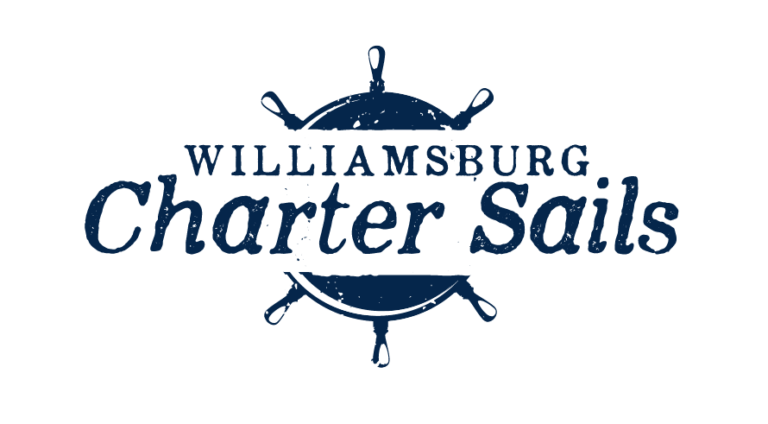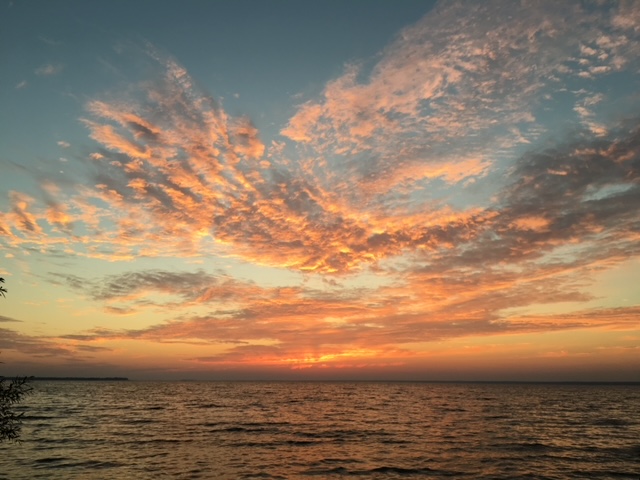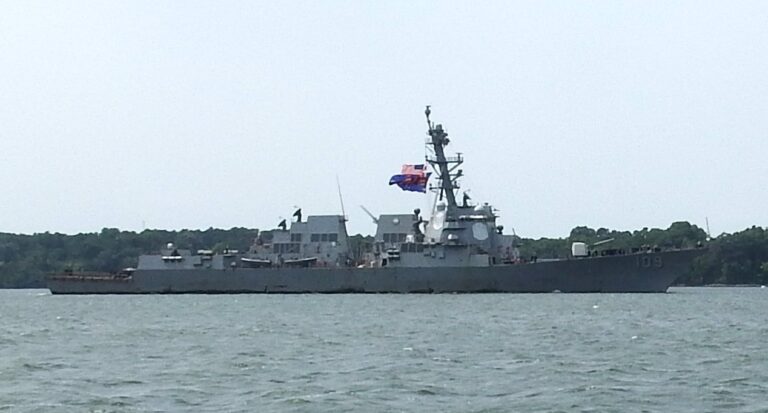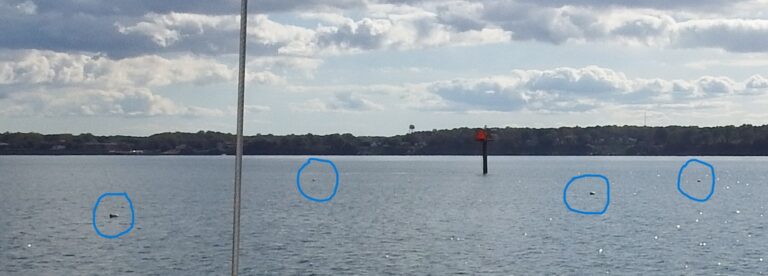Then.People ask, “What’s with the pirates?” The Battle of the Capes was a classic sea battle. Not so the battles by pirates. George H. Patton’s “Patriot Pirates: The Privateer War for Freedom and Fortune in the American Revolution” presents another story. Here is the tale of America’s insurgency against the British merchant ships and Navy. It was called privateering. This excerpt recounts the gruesome experiences of Andrew Sherburne. He sailed in the young Continental Navy and abroad a privateer ship during the American Revolution.
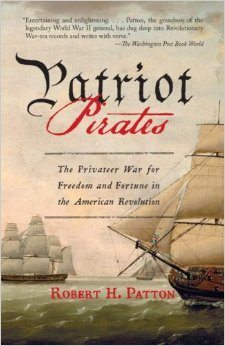 “The 18-gun sloop Ranger was outfitted at Portsmouth, New Hampshire, by John Langdon in 1777. It wreaked havoc off Scotland and Ireland under John Paul Jones. After Jones was detached to command Bonhomme Richard two years later, Ranger returned to refit for a cruise to the Caribbean.”
“The 18-gun sloop Ranger was outfitted at Portsmouth, New Hampshire, by John Langdon in 1777. It wreaked havoc off Scotland and Ireland under John Paul Jones. After Jones was detached to command Bonhomme Richard two years later, Ranger returned to refit for a cruise to the Caribbean.”
“Visiting the town waterfront with his father one day, young Andrew Sherburne found it a stirring pageant of color and industry.’ Ships were building, prizes taken from the enemy unloading, privateers were fitting out, standards waved on the forts and batteries, the exercising of soldiers, the roar of cannon, the sound of martial music and the call for volunteers so infatuated me that I was filled with anxiety to become an actor in the scene of war.'”
“His father let him join Ranger’s crew only because it was ‘in service of Congress’ and not a seedy privateer. Life on shipboard introduced the boy to boxing, drinking, and the ‘abominable practice’ of cursing.”
“He waited on Ranger’s officers and ‘in time of action’ carried ammunition to ‘the third gun from the bow.’ One prize was the three-deck Holderness. They looted cotton, sugar, rum, and spices. And that made the voyage a hit. Because it was armed with 22 cannon, the transport was designated a warship and thus awarded 100 percent.”
“Sherbume’s naval salary was $6.66 a month. His share of Holderness’s loot was ‘one ton of sugar, from thirty to forty gallons of fourth-proof Jamaica rum, about twenty pounds of cotton, approximately twenty pounds of ginger, log-wood, and allspice, and about $700 in paper money equal to one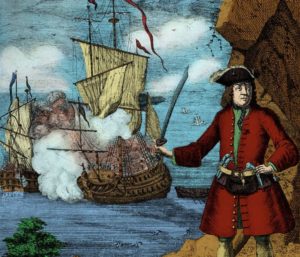 hundred dollars in specie.’ At age fourteen, he’d become his family’s star breadwinner.”
hundred dollars in specie.’ At age fourteen, he’d become his family’s star breadwinner.”
“In the spring of 1780 Ranger took part in the failed defense of Charleston against an assault of British land and naval forces. It was Sherburne’s first heavy combat. Captured, he was shocked by the spectacle of redcoat ‘hurried into eternity’ by accidentally sparking a storehouse of gunpowder.”
“Sherburne got back to Portsmouth within a few months. He found his family in shambles. His father and older brother had been lost at sea aboard trade ships. His motherwas working as a seamstress to support her two daughters and youngest son.”
“‘Almost sixteen and pretty well grown,’ Sherburne gave in to a recruiter’s persuasion, to ‘take a short cruise in a fine schooner and make your fortune.’ He joined the ‘jovial company’ of the privateer Greyhound. ‘She had between twenty and thirty boys, some of them not a dozen years old.'”
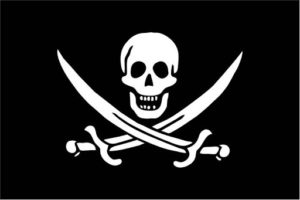 “Dispatched with a small crew to sail Greyhound’s first prize back to port, Sherburne soon detected that his prize master was ‘completely deranged.’ The man had deserted from the Royal Navy, now consumed with dread of recapture. His anxiety drove him to fold his clothes neatly on deck one night. He jumped naked over the side and disappeared.”
“Dispatched with a small crew to sail Greyhound’s first prize back to port, Sherburne soon detected that his prize master was ‘completely deranged.’ The man had deserted from the Royal Navy, now consumed with dread of recapture. His anxiety drove him to fold his clothes neatly on deck one night. He jumped naked over the side and disappeared.”
“Run down and boarded by British privateers, Sherburne and the rest of the prize crew became incarcerated in a Canadian village. Earlier, it had been previously ‘visited’ by American raiders who’d plundered its stores and terrorized its citizens. Fortunately, a Royal Navy ship, Duchess of Cumberland came to take the prisoners to Newfoundland for exchange.”
“On the way, a gale whipped up and drove the vessel onto the rocks. A column of seawater gushed into the hold. The helmsman got thrown overboard and crushed between the hull and the rocks. Two sailors swam to shore clinging to a wooden spar to which a rope was tied. Sherburne became the fifteenth man to pull himself along it through the raging surf. Then the survivors trudged to the nearest port, where the Americans wound up on a British transport bound for Plymouth, England.”
“There, a court of ‘elderly judge all wore large white wigs.’ They sentenced Sherburne to Mill Prison ‘for rebellion, piracy, and high treason on His Majesty’s high seas.’ When released in the spring of 1781 malnutrition had taken its toll. ‘I walked poorly even with two canes.'”
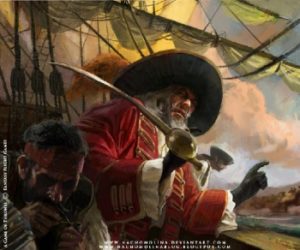 “Disembarking in Salem, he learned that Greyhound had taken a valuable prize and its original crewmembers were entitled to ‘sixty-three pounds sterling each.’ But having left his mother power of attorney in his absence, he found that she’d drawn his money and spent it. Then, still lame and gaunt from his captivity, he signed on to Scorpion. The transport carried eight small guns and a letter of marque. The letter entitled it to take prizes during its trade run to the West Indies. Of course, he would have preferred to remain on land and convalesce, ‘but this business would not do to live by.'”
“Disembarking in Salem, he learned that Greyhound had taken a valuable prize and its original crewmembers were entitled to ‘sixty-three pounds sterling each.’ But having left his mother power of attorney in his absence, he found that she’d drawn his money and spent it. Then, still lame and gaunt from his captivity, he signed on to Scorpion. The transport carried eight small guns and a letter of marque. The letter entitled it to take prizes during its trade run to the West Indies. Of course, he would have preferred to remain on land and convalesce, ‘but this business would not do to live by.'”
“Eighteen months later he would return to Portsmouth after trekking overland from Rhode Island. Meeting him at the outskirts of town, his younger brother almost fainted at the sight of ‘my bones projecting’ beneath the skin. At last, Sherburne staggered the rest of the way home on his brother’s arm and collapsed into bed, where he remained for twenty days. ‘I was very unwell,’ he wrote.”
—Reprinted and condensed courtesy of the Museum of the American Revolution in Philadelphia
Let’s Go Sailing with Patriot Pirates
Scroll down Rates and pick a day for a sailboat charter. Scroll down Reviews on Trip Advisor. Go back to the Home Page of Williamsburg Charter Sails.
sailing with patriot pirates sailing with patriot pirates sailing with patriot pirates
